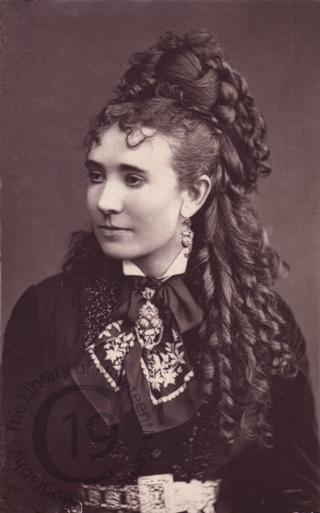
Ada Ward
A Woodburytype portrait of the British actress Ada Ward.
Ada Ward first appeared on the London stage in the mid-1870s. She clearly possessed a kind heart. On 28 October 1887 it was reported in The Times that a thirteen-year-old boy called Robert Walters had been charged with 'sleeping in the open air and having no visible means of subsistence' but that 'Miss Ada Ward, an actress' had 'volunteered to adopt the boy and educate him'. The report continued that Miss Ward had 'undertaken to send him to school and have him instructed in a trade suitable to his condition in life.'
She later caused a sensation in 1897 by leaving the stage, joining the Salvation Army as a preacher and working in the slums of London. The story was reported as far away as California. The Los Angeles Times titled their report: 'A PRETTY ACTRESS RENOUNCES THE STAGE FOREVER. She Gave Her Wardrobe and Jewels Away and Has Donned the Uniform of Gen. Booth and His Band of Valiant Warriors.'
The story was also reported in some detail in Australia, since Ada had toured there several times. According to the Brisbane Courier (13 April 1897): 'Miss Ada Ward, an actress who was a great favourite in Australia in 1887, has [...] just terminated her connection with the stage under sensational circumstances. At the conclusion of the performance of "The Forger's Wife" (in which Miss Ward undertook the character of Elinor Hylton), at the Prince's Theatre, Portsmouth, on the 27th February, she called her company together, and told them she had renounced the theatre for ever, in order to join the Salvation Army as a preacher. She divided her wardrobe and jewellery among the company, and, having donned the Salvation Army garb, she next day preached to a large audience in earnest language at the Army barracks. She said that after long years of wandering peace and rest had entered her heart, and she was happy. Many were moved to tears by her address. [...] She has been connected with the stage for over twenty years, has divorced one husband, and outlived a second. She has appeared with success in many emotional plays, but her best part was Lady Isabel, in "East Lynne." Her abandonment of the stage for religious pursuits recalls the celebrated case of Sheridan Knowles, who, in 1843, adopted a very similar course.'
According to an interview she gave a Sydney newspaper in 1912, she'd had enough of religion and 'the unkind way she had been treated by the Christian profession'. The reporter described her as 'a much crest fallen woman' with 'a sorrowful expression in her voice' and quoted her as saying: 'I'm just full up of all this business, but I do not exactly know what I am going to do yet, beyond that I have almost finished with mission work. Left alone everywhere I go, it is no wonder to think I am giving up Church work for ever' [Evening Post, 16 April 1912]. 'Since she had left the stage she had led a desperately lonely life and she could bear it no longer. She would return to the "dear theatrical people" who were noble and generous' [Nelson Evening Mail, 16 April 1912].
Photographer unidentified.
Code: 125548




